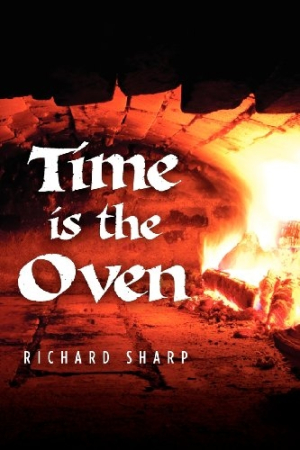Time Is the Oven
Richard Sharp is the author of two prior novels: The Duke Don’t Dance, a well-received contemporary tale, and Jacob’s Cellar, the story of an intrepid family of nineteenth-century Missouri pioneers, both published in 2012. His newest novel, Time Is the Oven, picks up a thread from the latter book, starting at the end of the American Civil War and following the life of one of its characters, William, a child during the war, into adulthood. Despite some common characters, Time Is the Oven stands on its own, and reading Sharp’s previous work is not essential to understanding or enjoying this most recent offering. Those familiar with his writing do have one advantage, however: They know to watch for the sly wit and tongue-in-cheek sense of humor that together seem to be this author’s trademark.
Time Is the Oven is decidedly not a Western in the classic sense, although it shares certain historical events glorified in many a novel of that genre. Jesse James and his brother Frank figure prominently, but it is Frank who stands out here, and not for the expected reasons. In fact, Sharp evokes a smile with a small reference to Frank reading “newspaper accounts and dime novels” about his more famous brother’s illegal exploits.
A great lover of Shakespeare’s works, Frank is particularly passionate about A Winter’s Tale. He peppers his conversations with Shakespearean quotes, emerging as a quirky, likable soul who becomes an odd friend and mentor to William. Only six years younger but inexperienced and less well read than Frank, William is initially baffled, though intrigued. Early on, Frank tells him that A Winter’s Tale is “the story of our lives,” and it is actually fun to watch as, like a play within a play, William slowly processes this theory and comes to recognize the parallels. Fans of A Winter’s Tale will appreciate the connection.
Sharp carries William away from the Wild West, through exploits elsewhere in the States, then down to Panama during the French attempt to build an isthmus canal. The historical detail is accurate, or, ironically, as accurate as it can be, considering the novel’s message about history, truth, and time. Perhaps it is best simply to say that Sharp’s historical specifics reflect those in the history books. A stickler for detail, this author would not have it otherwise.
Time Is the Oven is a multilayered invention. At the most basic level, it is the account of one young man and his evolution from farm boy to more worldly entrepreneur. The real spark comes from all the extras that Sharp injects. Character development, for instance, is superb. Realistically, even the most likable characters are not always endearing, and certainly none of them has all the answers. William, especially as he matures and deals with circumstances over which he has no real control, becomes a far more complex character. The Shakespearean bent adds a delightful extra dimension, and the cultural, social, and historical references ground the story in time and add relevance to the plot.
Finally, Sharp’s humorous afterthoughts provide just the levity the novel requires. Statements such as, “Boys, like puppies, always think they’re bigger dogs than they are,” sometimes seem to come out of nowhere, yet, very oddly, they fit. Unfortunately, too many errors in the text itself—typographical errors, word drops, and the occasional grammatical mistake—detract from this otherwise fine new offering from Richard Sharp.
Reviewed by
Cheryl Hibbard
Disclosure: This article is not an endorsement, but a review. The publisher of this book provided free copies of the book and paid a small fee to have their book reviewed by a professional reviewer. Foreword Reviews and Clarion Reviews make no guarantee that the publisher will receive a positive review. Foreword Magazine, Inc. is disclosing this in accordance with the Federal Trade Commission’s 16 CFR, Part 255.

